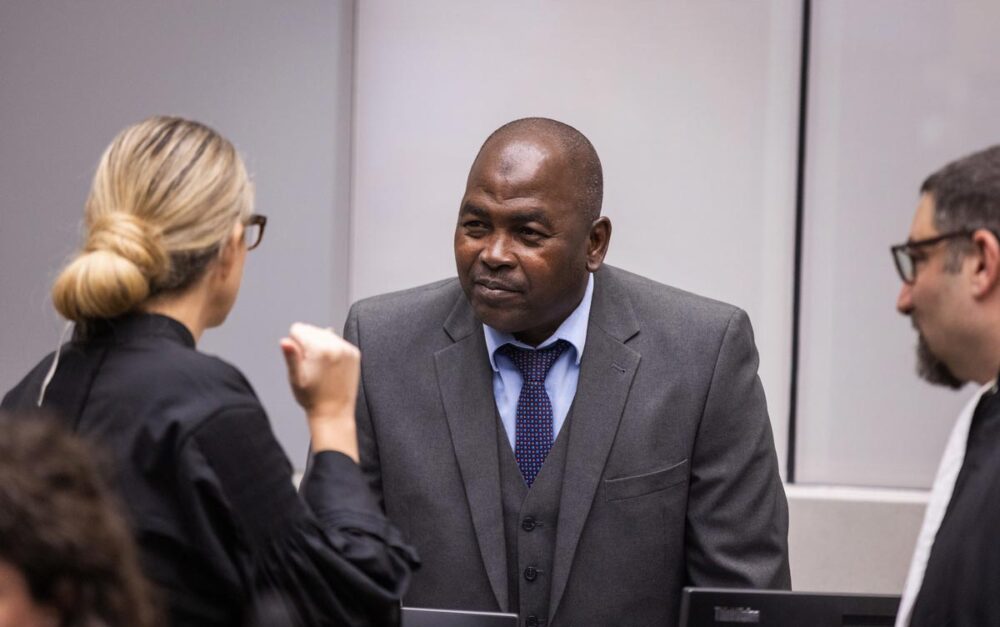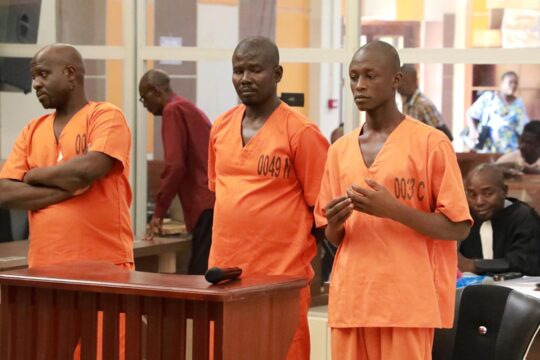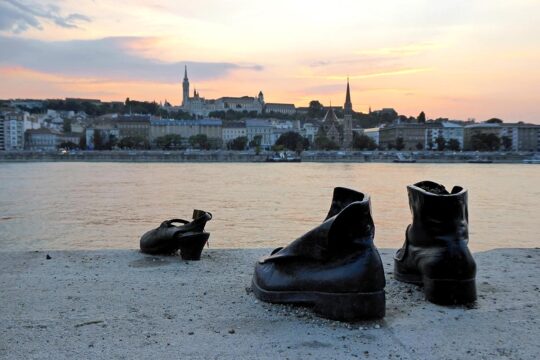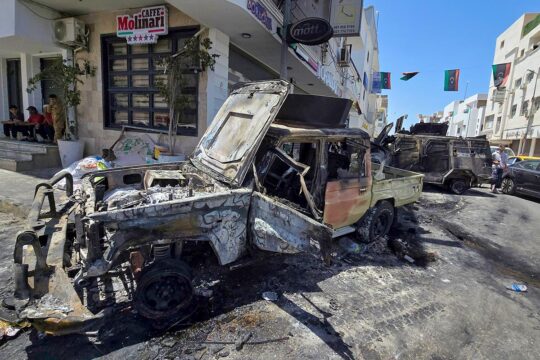The prosecution in the trial of Mahamat Said Abdel Kani closed its case on 15 November 2024, having presented 58 witnesses. The former general of the Popular Front for the Rebirth of Central African Republic (CAR) and commander of Seleka is an important part of the International Criminal Court (ICC)’s efforts to be seen to be even-handed, since Bangui referred itself to the ICC for the second time in May 2014.
The second investigation was into alleged crimes against humanity and war crimes committed in the country since August 2012 by two forces, the anti-Balaka and the Seleka during intense and bloody civil strife. Since then, a mixed tribunal the Special Criminal Court has been set up, but the ICC has continued its involvement with a recently wrapped-up case against two anti-Balaka officials and Said, a senior Seleka figure.
He was arrested in 2021, in relation to his alleged role at the special police unit headquarters in Bangui, the OCRB - the Central Office for the Repression of Banditry Office central pour la répression du banditisme. The prosecutor Karim Khan outlined its case in opening statements in September 2022, saying that the war crimes and crimes against humanity charges “are really quite awful”. “These were not isolated incidents. They were part of a widespread or systematic attack directed against the civilian population,” he continued.
Much was made of an underground detention space at the OCRB building.
“Mr Said had an office… in that office, he controlled the whole of the facility. And what is more, literally under his feet, he put civilians in a space called the hole. In that hole, civilians were kept in really putrid conditions, filth around them, their own feces, stale air, lack of ventilation; treated not as humans, not even as animals, a class below. Their humanity apparently eviscerated by the policies and action of the accused that faces trial in these present proceedings. There they were not given water. There was no due process. They were cut off in every sense from the protection of the law,” Khan told the court.
Since then 58 witnesses have testified, outlining Said’s alleged position in the Seleka hierarchy and especially his role at the OCRB.
Chaos and criminality rather than armed conflict
The multi-pronged approach of the defence to challenge the prosecution case, lead by Jennifer Naouri, supported by Dov Jacobs, was outlined in their opening statements in 2022.
They questioned the prosecution depiction of the Seleka as an organised group, underlining the reality of what the Seleka was had “never” been discussed during an international trial. Also, “the existence or, more specifically, the absence of an armed conflict between March and September 2013 has never been debated,” said Naouri. And that “the chaos and the criminality that prevailed in the Central African Republic between March and September 2013 has never been analysed”.
In addition, the defence alleged that “the prosecution has built its case on a biased and sketchy narrative, very far from the reality of what actually happened in the Central African Republic at the time”. They also planned, she said, to question the “incomplete evidence, evidence that has not been corroborated, evidence full of hearsay, evidence that has not been authenticated and that is lacking in reliability, evidence that has come out of a poor investigation. In one word, weak evidence”.
Naouri also said “the Prosecution's theses are very far from the reality of the Central African Republic and their entire -- their entire case is built on sand, on false premises, on preconceived notions and on historical, cultural and political conflations - how shall I put this, lumping things together that - comparing apples and oranges”.
No armed conflict, no war crimes
“Facts are stubborn things’” she said and “in the absence of an armed conflict between March and September 2013, the period of the charges, there simply was no war crime during that period. All allegations of war crimes against Mr Said must thus be dismissed.” Naouri quoted the report of the UN International Commission of Inquiry on the Central African Republic, “the UN experts, after a careful and factual analysis of the situation found that -- now I’m quoting: ‘The level of hostilities between March 2013 and 9 early December did not reach the level required to conclude that an armed conflict existed.’”
“They are saying that the OCRB was a torture centre that was designed as such to propagate terror and suffering… But this is completely disassociated from reality. This office is a building built by the French to shelter a police station.” “The reality is that the OCRB was completely disorganised. No one could be identified as being in charge. And it was impossible for Mr Said, a volunteer, … to hold him responsible for what other people may have done,” she continued.
“Salt into the wounds”
Accordingly, during the prosecution presentation of evidence, the defence strategy was to challenge each witness and build up an alternative picture of events in the CAR during 2013.
The prosecution’s first witness P-0547 t was first of nine planned to talk about his experience in the underground cell - how he was beaten and tied up, and tortured at the OCRB.
Naouri questioned the witness closely about the layout of the OCRB, and on Said’s alleged role. But later she also brought up his relationship with the prosecutors who had questioned him. The witness sharply rebuked her, “you are accusing me of getting money for answering your questions. I’m helping you answer the questions in the interest of your client, to establish the truth. Nobody gave me money. I was in a difficult situation. Don’t take me backwards. I have suffered a lot”. The witness though agreed he had received some money for medicine. “Madam, you are putting -- you are rubbing salt into the wounds. When I bought medicine, I also provided them with the supporting documents, with the receipts”.
Nearly two years later in October 2024, the last prosecution witness was Jean-Jacques Demafouth Mafoutapa, a CAR diplomat who had previously testified in Yekatom and Ngaissona trial. He was not questioned further by the prosecution who simply entered his previous testimony into the record.
He began under cross examination from Naouri to explain that “after arrival of the Seleka, they broke down everything. No courts were functioning, everyone fled, the armed groups were handing down justice in the provinces and everywhere”. He continued to answer her detailed questions about the origins of the Seleka in the early 2000’s.
But Naouri was questioned herself by presiding judge Miatta Samba: “I see we are going into 2006, 2008, the origin of all of these … military forces or groups. I want to know, really, what's the relevance of these lines of questioning. Because we've done, like, two hours, three minutes now, same questions along similar lines, and, you know, considering the document containing the charges, the temporal scope, what's the relevance of these questions?”
“When they arrived in Bangui in 2013, the Seleka coalition was a coalition, as reflected in its name, it was groups that came together. If we don’t understand who these groups are and why they formed, well, we won't be able to understand the charges as they exist, and the defence won't be able to make its case. He is the last prosecution witness in a position to answer about these groups,” Naouri replied.
Playing catch up
Defence counsel Iain Edwards, who has appeared at several international tribunals, and would not comment directly on the Said defence, outlined to Justice Info some of the challenges for a defence in building a case at the ICC. “We only come on at the very end,” he said, and while the prosecution has developed its relationships with states, prosecuting authorities and with victims “we are always playing catch up”.
Natalie von Wistinghausen, also a defence and victims counsel at the ICC, also chimed in to Justice Info: “Equality of arms is a nice aspiration, but stays an illusion”.
She describes how difficult it can be with evidence that is “disclosed on a rolling basis, very often without structure, and the limited time to digest it, to search for the needle in the haystack, to conduct the necessary investigations to challenge the prosecution case”.
“It's not easy. It’s very time-consuming. wearing many different hats and having to multitask” in limited time, especially managing and consulting with your client, says Edwards, and while it is not for the defence to prove their case beyond reasonable doubt “you have to put a reasonable alternative to the prosecution’s theory”.
From seven witnesses to one
Court records show that in January this year the Said defence team had a preliminary list of seven witnesses but that it was facing difficulties in finding those who were prepared to testify. In the Yekatom and Ngaïssona trial the defence teams brought 19 witnesses and entered tens of interviews into the record. In February, the Said defence filed a request for an extension of time to conclude its ongoing investigations. The defence had requested that Dov Jacobs, co-counsel, be allowed to testify as an investigator, having been on mission in the CAR. That request was refused.
Finally, on March 17, the defence provided its - so far - only witness.
Thomas Cantaloube was a journalist and reporter of around 25 years’ experience and formerly international correspondent for 12 years for Mediapart in France. He covered several conflicts for the news organisation, and explained that the Central African Republic, a former French colony and with French military interest, became one of his subjects.
He wrote in June 21, 2013, his first article which sought to explain to French readers on what was happening, based on “an informal meeting” in Paris with Médecins sans Frontières and other NGOs working in the Central African Republic.
Naouri focused in on the elements of the article that support her thesis that the Seleka was disorganised. “They all described the Seleka as a coalition of individuals who came together to descend on Bangui but who did not have any particular affinities”, said Cantaloube. Naouri then quoted from the article “witnesses who went to the Central African Republic at the end of this month have talked about power, that has very little control over anything. Even president Michel Djotodia does not seem to have command over his immediate troops.”
Cantaloube also had briefings in preparation for trip to the CAR, from which he later quoted Thierry Vircoulon from the International Crisis Group as saying “The Seleka no longer exists. The only thing that unites them was taking power in Bangui today.”
“I spent 15 days… in the Central African Republic,” Cantaloube tells the court. He described Bangui as peaceful during his time in October 2013: “the opposite” of a warzone.
Prosecutor Holo Makwaia asked him: “Therefore, Mr Cantaloube, you would agree with me that you could not tell this Court what happened to civilians, whether Muslim or Christian, during the month of March, April, May, June, July, August through September, before your arrival; isn't that right?”
“I was not present during the events that occurred in those months, but I did monitor the situation through witnesses who were on site and also through diplomatic sources,” replied Cantaloube. Makwaia also challenges Cantaloube on whether he could identify an armed conflict. Cantaloube challenges back: “Having covered a number of armed conflicts as a reporter, for example, Iraq, Afghanistan, the war in Libya, the war in Mali, Somalia…I am able to understand when an armed conflict is underway with people who are constantly shooting at each other. That’s the minimal definition of an armed conflict. And in the Central African Republic there were skirmishing throughout the country, but you can't call it an armed conflict. In the CAR, I think it was obvious that you couldn't call it an armed conflict, in any event, between March and October, November 2013”.
“I would like to say that this is a definition from a journalist. I’m not a legal expert”, he however added when questioned further.
A final extension
On 21 March 2025, Said’s defence filed an updated ‘List of witnesses’ and told the Chamber how far it had gotten in its investigations. The defence requested another month for interviewing officials. Plus more time for written submissions and evidence.
Judges at the beginning of April did not seem fully convinced: “Although progress on all fronts seems still possible, the Chamber is concerned about the uncertainty of whether and, if so, when the defence will obtain the information it is still waiting for. It is also uncertain whether any newly obtained material will prove relevant for the preparation of Mr Said’s defence.” “In principle,” they continued “the defence investigation should already have been finalised by now” and they warned that they “will not postpone deadlines indefinitely”.
They then rapped it over the knuckles saying “the defence has had several years to conduct its investigation, including one full year during which there were no hearings due to Mr Said’s medical situation… In this regard, the Chamber recalls that it encouraged the defence, over three years ago, to begin its investigative work without delay, highlighting that, at that time, the defence was already in possession of the core of the prosecution’s evidence”.
Said’s defence have until 2 May this year for adding new items of evidence or - if any new ones can be found - “adding additional witnesses”.








